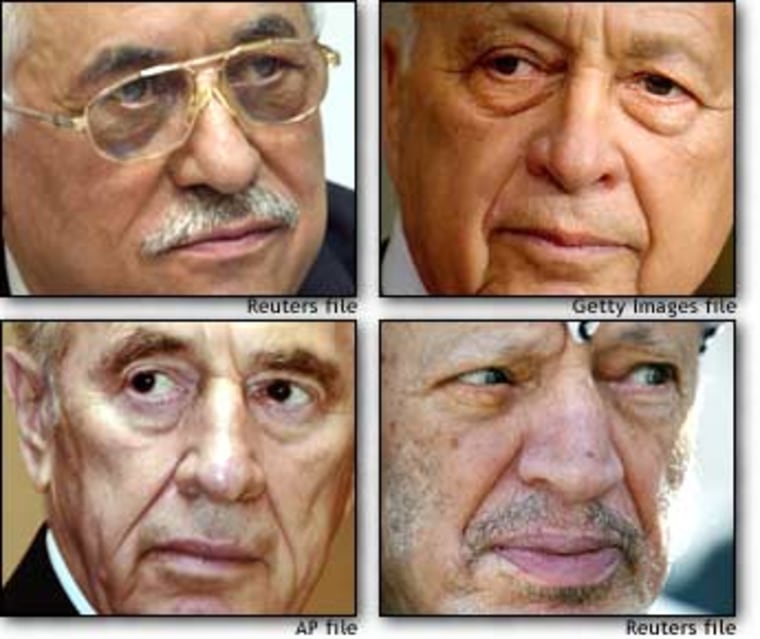Like a long derelict engine, Israeli-Palestinian peace talks, coaxed along by fidgety American mechanics, appear to be on the verge of sputtering to life once again. This latest vehicle for a comprehensive settlement of the world’s longest running conflict comes complete with a “road map” and three new passengers who all largely agree on the ultimate destination. Yet even before formal haggling begins, there are indications that the two key parties may be as interested in building smooth exit ramps as in completing the journey.
THE OFFICIAL White House announcement Wednesday that President Bush will attend a summit in Jordan on June 4 with the Israeli and Palestinian leaders confirms the American president’s entry in earnest into a foreign policy arena that has bedeviled his predecessors, Democrat and Republican, dating back to the Eisenhower administration. For the first time since September 2000, when the teetering Oslo peace process finally collapsed in violence, there is reason for optimists to hope that a political track may finally be possible.
So, is it possible that the “road map” formulated by the U.S., Russia and European Union, and subsequently approved by both Israel and the Palestinians, could actually settle this bitter conflict by 2005, as the map proposes?
Early indications, drawn primarily from the political maneuverings inside the Israeli and Palestinian governments, and from the public statements of American officials, are that the “road map” is a poor guide to what is about to happen. If the past history of such talks is any indication — indeed, even if the past few weeks are used as a measuring rod — prospects for a settlement in two years appear remote.
OFF THE MAP
As any good general will attest, the most important element in securing victory is in controlling where, when and under what conditions the battle is engaged, as well as ensuring that an escape route exist should the enemy prove tougher than expected.
Since the White House publicly released the “road map” a month ago, controlling the battlefield, or in this case, the agenda and ground rules of the upcoming talks, is precisely what Israel’s prime minister, the retired general Ariel Sharon, has been doing.
Sharon wants to ensure that the most difficult issues are not in play once the peace talks grow in stature to become a question of personal political credibility to an American president, as they did most famously with Bill Clinton at the end of his term in 2001.
SPINNING TOWARD THE TABLE
During the run up to talks, Israel can afford to be stubborn without risking an affront to their nation’s most important ally. Once Bush commits himself, however, that dynamic will change and Sharon risks alienating Bush and inviting real pressure, such as the ban on settlement aid Bush’s father instituted in 1990 to push a previous Israeli leader into talks with the Arabs, if he digs in his heels.
With this in mind, Sharon last week made comments in the Israeli parliament, the Knesset, that caused an uproar among his rightist supporters. Sharon, considered the founding father of the “Greater Israel” movement that underpins the settlements in the West Bank and Gaza Strip, referred to Israel’s presence there as an “occupation.” The affect abroad was predictable: a rash of stories pronouncing new hope for the peace process, and “cautious optimism” in the White House.
But the statement was quickly spun in the Israeli media as just a means to an end, a way of mollifying the Bush administration, who won the support of many Arab and European states during the Iraq war by promising to take a harder line with Israel on the Palestinian issue once Baghdad had fallen.
On Monday, the other shoe dropped as it was revealed, again in the Israeli media, what Bush had conceded to win Sharon’s acceptance of the “road map.” Among the key “objections” that the Bush administration has pledged to consider: there will be no talk of dismantling large Israeli settlements or of the status of Jerusalem during the talks — these issues must be reserved for a “final status” talks in 2005. Additionally, Palestinians must give up their demand for a “right of return,” a condition that automatically creates a constituency of some 3.6 million Palestinian refugees living outside the occupied territories who will be bitterly opposed to such a solution.
And, in an indication of the hall of mirrors Bush is now entering, Israeli officials quickly spun the “objections” in the western media as merely a way to mollify Sharon’s angry Likud Party back home.
GOOD COP, BAD COP II
InsertArt(1933553)In the shattered Palestinian Authority, meanwhile, no one needs to leak the potential objections that will emerge during a protracted step-by-step peace process. Hamas and Islamic Jihad stepped up their terrorism on cue — literally the day after the “road map” was made public.
Another serious challenge emerged Wednesday when PLO Chairman Yasser Arafat claimed that he, not newly minted Prime Minister Mahmoud Abbas, would be the chief architect of the Palestinian position in any talks. Abbas, better known as Abu Mazen, would clearly not able to make promises on behalf of the Palestinians in such a situation.
For much of the last two years, the Sharon-Bush strategy has been to sideline Arafat, who has been deemed to be too unreliable and too closely tied to militants within his Fatah movement responsible for some of the worst of the recent wave of suicide bombings. Abu Mazen’s rise to the new post of prime minister was, ideally, supposed to be the end of Arafat as negotiator.
In fact, many now suspect a kind of “good cop, bad cop” situation in the Palestinian Authority, allowing Abu Mazen to present a reasonable face to the world as Arafat pulls the strings behind the scenes, all the while holding the threat of a new wave of violence over Israel’s head. The prime minister, meanwhile, would be able to claim that any violations were outside his control.
To students of this conflict, this will be familiar. Until the dovish Labor Party quit his coalition last year, Sharon had a similar dynamic at work featuring Shimon Peres as his sincere but somewhat powerless foreign minister.
Such situations make it very difficult to enforce concessions made at the peace table, and very easy for one side or the other to renounce such concessions if they prove too politically difficult.

LAX AMERICANA?
All of this sets a very messy table for President Bush, who now enters that most thankless of all diplomatic endeavors: Middle East peace diplomacy.
By agreeing to attend next week’s summit in person, rather than dispatching Secretary of State Colin Powell or another senior aide, Bush is indicating that he will stake his own reputation on the effort to set the process in motion once again.
He also has agreed to send a high level team led by NSC advisor Elliot Abrams and Richard Burns, an assistant secretary of state, to the region to follow up the talks, suggesting to some that the Americans expect the summit to produce real and immediate “action items” to follow up.
Over the longer term, however, the real test of whether the United States is in it for the long run will be how much political capital the president is willing to expend when this new vehicle for peace veers off the road. If things go badly, watch for Powell to wind up holding the bag.
“By virtue of his unequivocal victory in Iraq, George Bush can force
Ariel Sharon onto the political path,” writes Israeli political analyst Amir Oren in Ha’aretz on Wednesday.
The question in everyone’s mind, however, is whether Bush is willing to keep Sharon or the Palestinians on that path when the road gets rough, even as a poor economy and a difficult occupation in Iraq compete for his attention.
Michael Moran is Senior Correspondent at MSNBC.com
